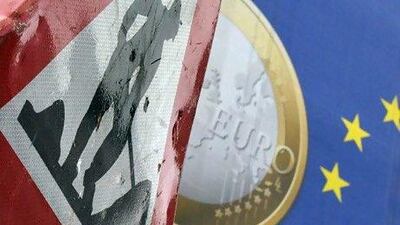The pace of collapse in the euro zone is accelerating. In the early stages of the three-year old crisis, requests for bailouts from essentially bankrupt states - Greece, Ireland, Portugal - were separated by months.
Now just a few weeks separate Spanish and Cypriot calls for financial rescue.
European Union leaders, who meet in Brussels tomorrow for yet another "crucial" summit, will no doubt present some compromise agreement on the way out of the crisis that they can sell as a definitive solution to the single-currency zone's problems. But they have been there so many times in recent months that they must all have permanent booths in the last-chance saloon.
It is difficult to see how there can be any other outcome this time to the standard formula of past failures: an apparently radical package of measures involving throwing vast sums at bust banks or stretched sovereign debtors; global financial markets react positively for a few hours before the cracks in the fudged package become obvious; followed by another run on a country's bonds or bank deposits, or the euro itself.
It's a depressingly familiar scenario. But behind the rhetoric each time there is a hardening of positions that will surely, one day, bring the whole euro-zone edifice down, or at least change it so drastically as to be unrecognisable.
There are now four distinct financial zones within the EU, each with a different agenda: the "hard" Scandinavian bloc, which has largely stayed out of the euro; the German-led "core", whose economies are solid enough to avoid austerity packages; the soft "peripheral" states increasingly in need of help; and the basket cases like Greece, Romania and Bulgaria.
It is virtually impossible to get all these countries to sing from the same song sheet. Their interests are so diverse as to question the practicality of bringing them together in anything more meaningful than the Eurovision Song Contest in the first place.
The tensions between the German core versus the periphery zones are where the fault lines are increasingly apparent.
Is France still a member of the core, or is it drifting towards the periphery? Spain looks to have finally abandoned any hope of being in the German core for the foreseeable future and Italy seems like the next bailout candidate heading towards peripheral status.
Smoothing over these differences will be a major preoccupation in Brussels. The leaders gathering there will probably be able to present one policy initiative as a major step forward: the idea of a "banking union" to tackle the basic insolvency of many financial institutions, especially on the periphery.
This is a seemingly sensible idea: a club of banks like a co-operative union that would look after its weakest members. It will probably be hammered out in the Franco-German meetings ahead of the summit proper.
But, again, this one falls at the final hurdle: who is the lender of last resort? Logically, it must be Germany and the EU institutions under its influence, such as the European Central Bank (ECB). But German taxpayers do not want to foot a seemingly endless bill. That has been the German position throughout (perhaps justifiably) on a variety of measures proposed as solutions, from eurobonds to underwriting sovereign debt by the ECB.
The Germans will not open their wallets until they get assurances on greater fiscal integration of the EU: approval of national budgets in Frankfurt; a common banking regulator; and strict adherence to debt levels on German principles.
Against the background of such a fundamental impasse, the talk of a euro-zone break-up is hardening by the day. A "Grexit" looks inevitable. There is even growing momentum behind a radical change to the terms of Britain's membership of the EU, perhaps even a withdrawal. Most ominously, the strains in the Franco-German alliance at the heart of the union are becoming irresistible.
The summit will try, once again, to paper over these cracks but they are widening ineluctably.
twitter: Follow and share our breaking business news. Follow us
iPad users can follow our twitterfeed via Flipboard - just search for Ind_Insights on the app.

